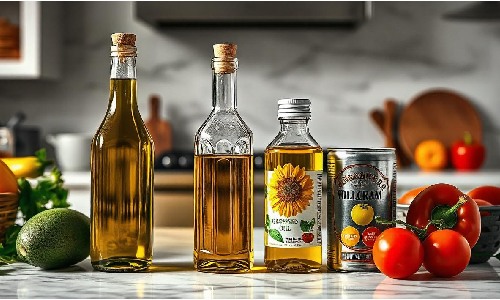Being a doctor, people often ask me – Which are the best cooking oils ? Cooking oils are an essential part of our daily meals. The type of oil you choose can make a big difference in your health. But with so many options available, how do you know which oils are actually good for you? Let me simplify it for you with an Ayurvedic perspective! The Best Cooking Oil According to Ayurveda When it comes to cooking oils, there’s no one-size-fits-all answer. Ayurveda teaches us that the best oil depends on your Dosha imbalances and overall health. So, let’s break it down in a simple way! Ayurveda has always been very clear about the use of the right kind of oils for cooking. Here are the top picks: Ghee – The Ayurvedic Superstar Ghee is clarified butter, which Ayurveda perceives as an excellent medium for cooking. It has many amazing health benefits. It’s great for blood, muscles, bones, and reproductive health. It’s Rasayana or rejuvenating, anti-aging, and great for the health of the eyes, helps improve intellect and memory, digestion, vitality, or Ojus, and skin health. Ghee is Guru or heavy. However, cooking food in ghee is a “Samskara” or processing that makes it easier to digest, break down and absorb. But, here’s something you need to know: Ghee might have so many health benefits and is generally good for everyone for improving gut health. But, it has to be used in small quantities, especially if you are someone with chronic indigestion and stomach issues. Since it’s Kapha increasing, do not consume ghee if you have a fever associated with cold and cough. Also, avoid ghee if you’re pregnant with a cold or upset stomach or if you suffer from diseases of the liver or spleen. Sesame Oil – The Nutrient Booster Sesame oil is highly esteemed in Ayurveda. If you want better nutrient absorption and stronger digestion, sesame oil is your go-to. It has sharp (Tikshna) and penetrating (Sukshma) qualities, which help sharpen your Agni (digestive fire). Great for overall health but not ideal if you already have excess heat in your body. When used in smaller quantities, the oil is good for Kapha and Vata Doshas and Krsa – Sthula (lean and fat). It’s also good for the heart and for people with less physical activity and those who tend to gain weight or with frequent coughs and colds. Coconut Oil – The Cool Healer Feeling exhausted after workouts? Have gastric issues? Coconut oil is your friend. It has a cooling effect and helps soothe digestion. But if you’re trying to lose weight, it might not be the best choice. Coconut oil is another excellent choice, especially for people living in hot climates. It helps to cool down the body and is best suited for people suffering from aggravated Pitta Dosha. Coconut oil is also great for people with high physical activity and have a tendency for gastric issues and skin diseases. However, this oil is not recommended for people with obesity and hyperlipidemia. Oils Not So Great for Cooking Now, let’s talk about the oils you should avoid or use with caution: Mustard Oil Mustard oil is excellent for people with diabetes but can be a nightmare for those with skin conditions like psoriasis and eczema. It can trigger flare-ups! If you have such conditions, stay away from it completely. Mustard oil is highly heating or Pitta aggravating. Therefore, if used by a person with Pitta imbalances, this may lead to issues like skin diseases, rashes on the skin, hemorrhoids, peptic ulcers, etc. However, if you’ve been using it since childhood, your body might have adapted to it. In such cases, it’s fine to continue, but in moderation. Refined Oils Canola, safflower, sunflower – these refined vegetable oils are highly processed and not good for your health. Avoid them completely. These oils have similar properties to mustard oil as they are highly heating and can aggravate Pitta Dosha. Regular consumption might lead to issues like skin irritations, ulcers, and excessive body heat. If you’ve been using them for a long time, it’s best to transition slowly to better options like ghee or sesame oil. If you grew up eating refined oils like sunflower oil, don’t blame your parents – it’s what the media told them was healthy. But now, we know better. Let’s not repeat the same mistake for the next generation! Grain Oils Grain oils, like rice bran oil are often marketed as healthy, but Ayurveda has a different take. While they might be good for external application – say, for treating itching or dryness – they aren’t the best choice for cooking. They lack the natural balance of essential fatty acids and can be hard to digest. Peanut Oil If your digestion is strong, peanut oil is fine. But be careful, it can aggravate Vata. If you have malabsorption or sluggish digestion, reduce it until your gut is back on track. What About Olive Oil ? Ah, the million-dollar question! People often ask me if they can use olive oil for cooking as they have heard many good things about it. Olive oil is not native to India. So, I haven’t seen any references to it in Ayurveda. However, in my experience, it’s best used in moderation. Do not use it for cooking. Instead, it’s great for quick sautéing, salad dressings, or even drizzling over hummus (my personal favorite!). How to Choose the Right Cooking Oil for You Choosing the right oil isn’t just about picking the healthiest one. It’s about considering your body type (Prakriti), digestion power (Agni), and Dosha imbalances. Here are a few general tips: For Vata Dosha: Go for warming oils like sesame oil and ghee to keep your digestion… Continue reading Good and Bad Cooking Oils
Good and Bad Cooking Oils
